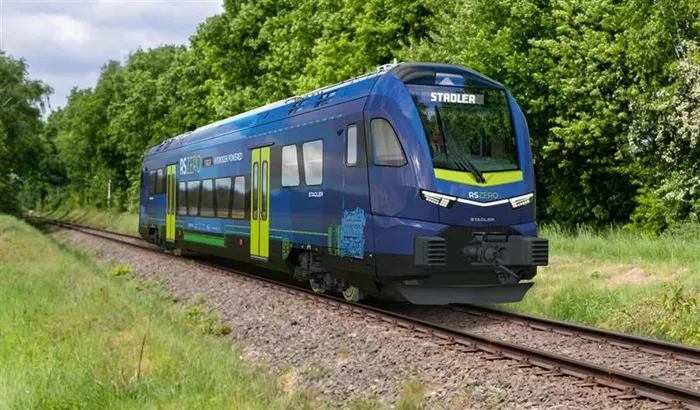Stadler, the Swiss rail rolling stock manufacturer, showcased its cutting-edge RS Zero prototype at the InnoTrans trade fair in Berlin, taking place from September 24 to 27. This new model is set to succeed the RS1 Regio-Shuttle, which has been in production since 1996, with approximately 500 units currently operational across Germany and the Czech Republic.
Unlike its predecessor, the RS Zero is designed to operate without diesel engines, utilizing hydrogen and battery packs to significantly reduce its carbon footprint. While details on whether the prototype is equipped with a fuel cell or hydrogen internal combustion engine have not been disclosed, the shift towards cleaner energy sources marks a significant advancement in rail transport.
Stadler’s data highlights that 38% of railway lines in Germany remain unelectrified, with this figure rising to 43% across Europe. Many of these lines are currently out of service, but revitalizing them could facilitate a shift from road to rail transport, alleviating congestion on highways.
The RS Zero is designed for adaptability, capable of accommodating various line features, whether electrified with charging stations or equipped with hydrogen refueling infrastructure. This versatility aims to create an economically viable transport solution, even on less trafficked secondary routes.
“We are proud to develop the RS Zero prototype at our Berlin site, following the successful battery-electric FLIRT Akku,” stated Jure Mikolčić, CEO of Stadler Germany. “Our commitment to technological innovation enables us to provide customers with tailored vehicles, contributing significantly to the transition in transportation.”
Available as either a single or double unit, the RS Zero can accommodate between 70 and 150 passengers, with an axle load of under 18 tonnes. Retaining the iconic trapezoidal window design of the RS1, the RS Zero features a low floor height and offers various interior configurations. Notably, the construction incorporates a high percentage of renewable and recycled materials, including PET bottles.
Despite the promising features of the RS Zero, the introduction of hydrogen rail buses has faced challenges. While all hydrogen trains produced to date, including 27 Coradia iLint trains by Alstom operating on the Taunusbahn line, are now in service, several units were initially reported defective. Additionally, finding qualified drivers for these trains has proven difficult, resulting in operational delays and a subsequent promotional effort of two months of free travel to restore customer confidence in the service.
Related topics:
- Deutz Unveils Hydrogen-Powered Stadler RS Zero Rail Bus Prototype at InnoTrans
- Amogy Launches World’s First Carbon-Free Ammonia-Powered Vessel
- Stäubli Unveils Innovative Quick-Charging Connector System for Electric Mining Trucks at MINExpo

